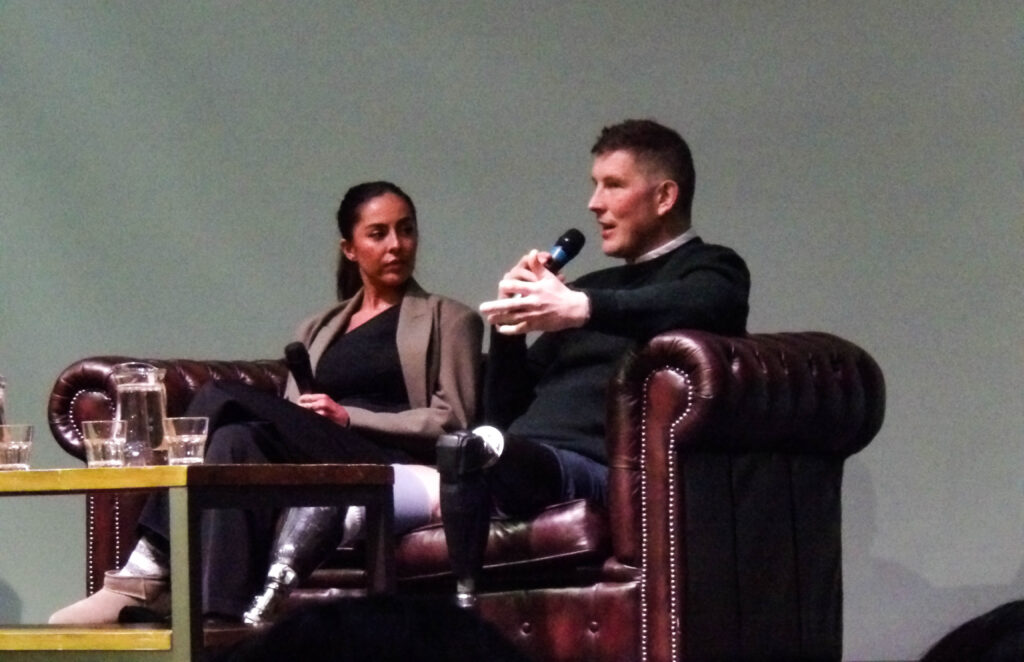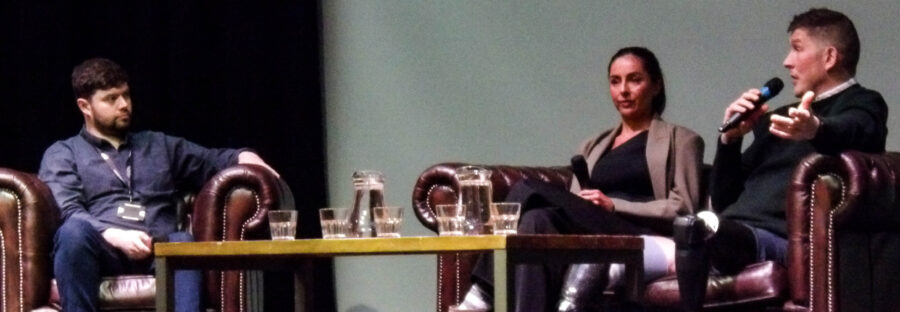Man Met hosts GB Paralympian and Sky Sports reporter for Future Me Week
Sky Sports’ Miriam Walker-Khan and GB Paralympic rower Gregg Stevenson opened up about their lives and careers for ManMet’s Future Me Week on Monday (20 January).
The pair spoke in a panel discussion on the first day of January’s Future Me Week lineup, which aims to give students opportunities to expand their skills and experience outside of the classroom through workshops and talks.
They followed on from BBC Radio One’s Jamie Laing, who talked about his own experiences on Made in Chelsea and his broadcasting career.
Walker-Khan works as a Diversity and Inclusion reporter for Sky Sports, while Stevenson is a gold-winning rower for the GB Paralympic team. Both have ADHD, and opened up about how disability, race, and mental health impact how they navigate their high-profile careers.

“I’ve had a squiggly career,” Stevenson said. “I joined the military because I needed more discipline in my life. I struggled sitting still. It was an environment where I could succeed: the rank structure, the arduous courses… it was a pass or a fail, and I really enjoyed that environment. I realised sport was quite similar: it doesn’t care who you are or where you’re from. If you get from here to there the fastest, you win a national medal. That’s all. It really appealed to me.”
Stevenson’s military career ended after he suffered a traumatic injury in 2009, leading to both of his legs being amputated. He went on to try out for the Invictus Games in 2018, which led him to his career in rowing for Team GB.
He said: “When I left the military, it was particularly tough because I had to be patient. I couldn’t just lace my boots up and go for a run. I wouldn’t be patient with myself, or with things like mental health, and that was quite a hard lesson. It took me four or five years to really get to the stage where I felt in control.
“The big thing in [the Paris Paralympics] was actually just going to compete. I thought it was a given. I didn’t realise that for disability sports, it’s sometimes seen as just the participation – ‘well done for turning up.’ We don’t just want an opportunity to represent, we want an opportunity to compete.”
For Walker-Khan, it was discrimination she faced as a woman of colour in sports media that made a significant impact on her career, as well as her experience with imposter syndrome and ADHD.
“A lot of people feel it’s their God-given right to be TV presenters, and I think because I didn’t grow up thinking that, I’ve always struggled with knowing my place in the media,” she said.
‘ADHD is my superpower’
“There are some times where [ADHD] can be a bit of a drawback, but it’s actually a bit of a superpower, as long as you can cope with it day-to-day: it makes you a bit different. It probably makes you a bit more interesting.”
When talking about her experience covering race in sports as a woman of colour, Walker-Khan highlighted mentor figures as being a key role in helping her feel supported.
She said: “I do a lot of stories about race and ethnicity, and sometimes I’m uncomfortable to be honest, making someone sit there and relive their traumas. But [it’s also difficult] to be taken seriously in an environment where there aren’t a lot of women of colour who tell sports stories in the media space.
“I was once told that I shouldn’t be reporting on an issue because I was a woman of colour, because I ‘couldn’t be impartial’. That was horrific, because I was like, why am I here? How can I do this job if the people high up in these organisations that I need to work with really think that? It was the hardest moment in my career, because I nearly quit.
“I actually reached out to a Pakistani Muslim journalist in Canada, and that was so important because she understood exactly what I was going through. If you don’t have people who understand your experiences in a place of work, you can become really isolated.”
Future Me Week will continue until Friday (24 January) with a full lineup of events available here.


